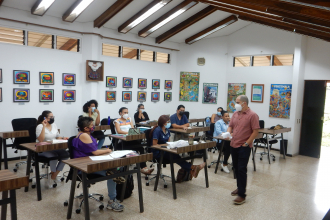Grid electrification should be combined with complementary infrastructure for greater social and economic benefits
Key findings:
While electricity is a key to economic development, nearly 600 million people in sub-Saharan Africa live without electricity.
This study analyses the socioeconomic benefits of electrification in Uganda.
The findings show that grid connectivity increases the number of work hours, female employment, household expenditure (meaning that the household is able to buy more of the goods that it needs), and key educational outcomes.
Furthermore, the benefits from grid connectivity increase with time.
Unmasking the mystery of the varying benefits from electrification
The evidence demonstrating the welfare impacts of electrification in Sub-Saharan Africa remains weak and inconsistent, leading some to assert that emphasis on access, in and of itself, is misplaced and that more should be done to identify the complementary conditions that are needed to deliver the anticipated economic growth and improved welfare outcomes. This project seeks to contribute to this debate, by focusing on the impacts of Uganda’s electrification efforts.

“Pursuing an academic career in agricultural economics converts my passion into work”
Meet Chizoba Obianuju Oranu, EfD Nigeria! She tells us about her first approach to environmental economics and the importance of having a mentor. She also shares the results of her research project…

EfD funds a postdoc position on gender issues
EfD researcher and WinEED (Women in Environmental Economics for Development) co-founder Erin Sills is announcing a special postdoc position on gender issues. The position is funded by EfD and will…

More women's voices in environmental economics
Women from Latin American countries are increasingly entering the academic field of environmental economics. This is apparent at the Tropical Agricultural Research and Higher Education Center (CATIE)…

Setting a research agenda for a transition to low-carbon transportation
Understanding the knowledge gaps to achieve a low-carbon transportation sector is essential to guide future research agendas. EfD researchers aim to provide a systematic review to identify these…
Replication: Do women shy away from competition? Experimental evidence from China
We investigate gender differences in competitiveness using a lab-in-the-field experiment and a subject pool consisting of Chinese adults following the design by Niederle and Vesterlund (2007). China provides an interesting environment to study since the country has promoted gender equality for a long time and the gender gap in earnings is small in cross-country comparisons. However, in many respects, China is still a patriarchal society. Our results show that women perform equally well as men in a piece-rate task and significantly better in a competitive payment environment.
Are People More Patient with Their Spouse’s Money? An Experimental Study
We study how partners in a household make decisions for themselves and for their spouses regarding intertemporal choices in a field experiment in rural China. We find that men, but not women, make decisions that are more patient for their spouses compared with their predictions of their spouses’ decisions, in particular when choices involved two delayed options. Instead the decisions for their spouse are close to the decisions they made for themselves. At the same time, we find evidence of sorting of preferences within households, i.e.
Pagination
- Previous page
- Page 17
- Next page
